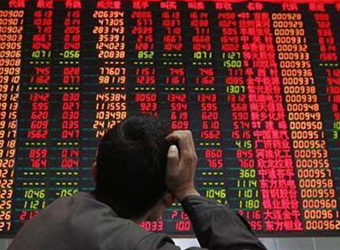Asian stocks struggled on Wednesday, as traders awaited a rates decision from the U.S. Federal Reserve and Dutch elections.
In Japan, the Nikkei 225 closed down 0.16 percent or 32.1 points at 19,577.38, as the yen strengthened against the dollar.
A stronger yen is generally seen as a negative for Japanese stocks.
Toshiba fell 12.3 percent to 189.50 yen per stock, after the Tokyo Stock Exchange put its shares under supervision to see whether it meets the delisting criteria following the conglomerate postponing its official third-quarter earnings.
“Instead of explaining how they would avoid delisting, Toshiba held a presentation focused on longer-term ‘Measures to Rebuild Toshiba’ and 2019 profit targets,” said equity analysts at Jefferies in a Tuesday note.
Australia’s ASX 200 closed up 0.26 percent or 14.9 points at 5,774.
South Korea’s Kospi fell 0.17 percent.
Earlier, local media outlets said the country wouild hold a presidential election on May 9 to replace the impeached leader park Geun-hye.
Prior to market open, official South Korean data showed the unemployment rate was at five percent in February, its highest since January 2010.
The jobless rate was at 3.8 percent in January.
On the Chinese mainland, the Shanghai composite was down 0.14 percent and the Shenzhen composite was off by 0.18 percent.
In a Wednesday news conference, Premier Li Keqiang stressed the need for China to have healthy relations with the U.S., and reiterated China’s stability in economics, financial markets and foreign policy.
President Donald Trump and Chinese President Xi Jinping are set to have scheduled talks next month.
Hong Kong’s Hang Seng was down 0.59 percent.
All eyes were on the Fed’s monetary policy decision, due Thursday morning Asian time.
“A U.S. rate rise is now baked in the market cake… the focus will shift to board projections,” said Michael McCarthy, chief market strategist at CMC Markets, in a Wednesday note.
Market expectations for a 25-basis-point rate hike stood at 93 percent on the CMC Group FedWatch Tool at 7:15 am HK/SIN time.
McCarthy said that any indications of a further three hikes this year could disrupt equity markets.
Over on Wall Street, stocks closed mildly lower, as energy stocks plunged.
The Dow Jones industrial average fell 0.21 percent to close at 20,837.37, weighed down by Chevron.
The S&P 500 closed down 0.34 percent at 2,365.45, with energy leading 10 sectors lower. The Nasdaq composite ended down 0.32 percent at 5,856.82.
European political headlines are another sideshow capturing the market’s attention.
Voters in the Netherlands will head to the polls later to elect the country’s next prime minister.
This is the first of several votes to take place across Europe and is seen as a bellwether for political sentiment in the region. Meanwhile, a spat between the Netherlands and Turkey dragged on.
Turkish President Tayyip Erdogan warned the Netherlands that his country could take further steps in the diplomatic row, while a government spokesman in Ankara said economic sanctions could be on the table.
In France, presidential candidate Francois Fillon was put under formal investigation on suspicion of embezzling state funds.
Jussi Halla-aho, member of the European parliament and front-runner in the race to lead Finland’s second largest political party said he would seek an exit from the euro zone and the European Union, Reuters reported.
The dollar remained relatively strong against the basket of currencies, trading at 101.65 at pm HK/SIN, above levels around 101.4 seen yesterday.
The yen traded stronger at 114.82 against the greenback versus yesterday’s highs above 115, while the Australian dollar was at $0.7569.
During Asian hours, oil prices recouped some of their losses. U.S. crude was up 1.49 percent at $48.55 a barrel while Brent crude added 1.22 percent to $51.69 by 2 pm HK/SIN.
Oil prices dropped to three-month lows on Tuesday during U.S. hours, after the Organisation of Petroleum Exporting Countries (OPEC) reported a rise in global crude stocks and a surprise output jump from Saudi Arabia.
U.S. crude had fallen to its lowest settlement price on Tuesday since November29, a day before OPEC’s supply cut deal.
Source: CNBC
